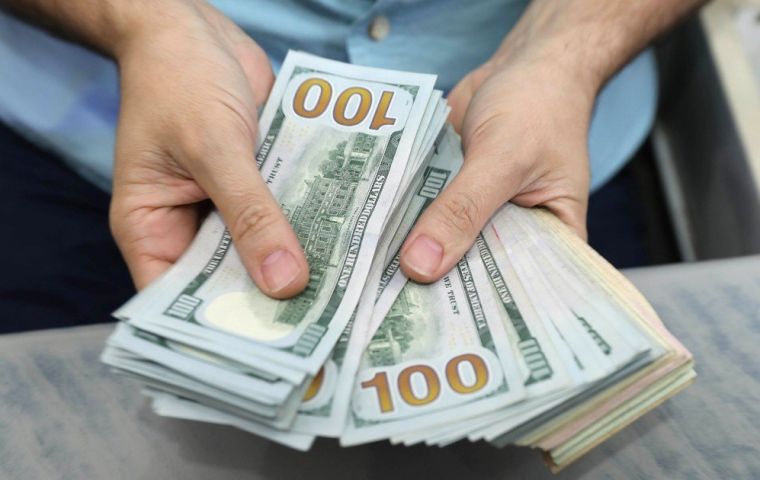MercoPress. South Atlantic News Agency
Argentine Central Bank wants tourists to exchange money through formal channels
 Tourists will be able to open their accounts either remotely or upon arrival in the country and their passports or travel documents will be required, the Central Bank said
Tourists will be able to open their accounts either remotely or upon arrival in the country and their passports or travel documents will be required, the Central Bank said As borders are about to reopen and tourists are expected to pour in, Argentine authorities have devised a mechanism whereby foreigners may exchange currency (US dollars) at a rate closer to the unofficial (“blue”) one.
Before Thursday, foreigners using their credit cards were recognized several Argentine pesos consistent with the “official” exchange rate (AR $ 100 = US $ 1), which is roughly half the “blue” quote (AR $ 197 = US $ 1). With the new system, foreigners operating through the formal markets credit cards go through would be recognized AR $ 180 = US $ 1, it was reported.
The Argentina Central Bank will allow foreign tourists who enter the country to open a bimonetary savings account to operate with their currencies within the formal economy, to seize actual dollar bills and keep them off parallel markets.
Visitors will thus be able to exchange their money through the market known as the “MEP dollar” and obtain about AR $ 180 for each US dollar.
“Foreign tourists visiting Argentina will be able to open a bimonetary savings bank [account] and access financial services and electronic means of payment, with the inherent benefits of transparency and security, as long as they have a bank account in their country of origin that will be the only one authorized to transfer foreign currency to the local account,” the Central Bank explained through a statement released Thursday.
Central Banks officials hope to grab “at least” 20% of the US $ 5,000 million that usually enter the country in a normal year. “Per year, between US $ 5,000 and US $ 6,000 million enter through tourism. This can serve to seize part of those funds for the formal economy. A conservative estimate may be between 15% and 20% of the tourism that enters through this account increases offering formal dollars and improving tax collection.”
If the official calculations are met, the monthly income through this route would be close to US $ 80 million, which would serve to offset the monthly sales that the BCRA makes in the financial market to keep the exchange rate at bay.
Tourists will be able to open their accounts either remotely or upon arrival in the country and their passports or travel documents will be required.
“These accounts may be used for purchases in shops in pesos in the country, both by debit card and through digital banking applications, and to make cash withdrawals from the national currency. They will also have the possibility of carrying out financial operations for the currency exchange,” the statement went on.
“The account must be in the name of a human person residing abroad, except for countries or territories where the Recommendations of the International Financial Action Task Force are not applied or are not sufficiently applied,” Central Bank CEO Miguel Pesce explained.
“In the accounts in pesos deposits, transfers from third parties or their use to make investments will not be accepted,” he added.
Foreign currency accreditations in this ”Savings Bank for tourists” must be made through transfers from accounts in the country of origin or through dollar deposits in cash, up to the total amount of 5,000 dollars. If there is a balance in the client's account in foreign currency at the end of their stay, those funds are to be wired back to the account in the country of origin and the local account is to be closed. No cash withdrawals in a foreign currency will be allowed.




Top Comments
Disclaimer & comment rulesCommenting for this story is now closed.
If you have a Facebook account, become a fan and comment on our Facebook Page!